
The Winnowing Fan BEYOND CRITICISM Taking advantage of new opportunities offered by digital technology and new insights from contemporary creative practice that take us from abstract theory back to literature itself, Beyond Criticism explores radical new forms that literary criticism might take in the twenty-first century. http://thebee.buzz Series Editors: Katharine Craik (Oxford Brookes University, UK), Simon Palfrey (University of Oxford, UK), Joanna Picciotto (University of California, Berkeley, USA), John Schad (University of Lancaster, UK), Lilliana Loofbourow (University of California Berkeley, USA). Published Titles: Macbeth, Macbeth , Ewan Fernie and Simon Palfrey Ceaseless Music: Sounding Wordsworth s The Prelude , Steven Matthews Forthcoming Titles: Blank Mount , Judith Goldman Character as Form , Aaron Kunin Desire: A Memoir , Jonathan Dollimore Just Play: Theatre as Social Justice , David Ruiter Orpheus and Eurydice: A Graphic-Poetic Exploration , Tom de Freston with Kiran Millwood Hargrave For Valerie The Winnowing Fan Verse-Essays in Creative Criticism Christopher Norris Bloomsbury Academic An imprint of Bloomsbury Publishing Plc

CONTENTS I If it didnt sound pompous as well as offering too many hostages to critical fortune, I would say that these pieces are mainly intended to launch a revival of that nowadays neglected literary form, the philosophical verse-essay. That I say it nevertheless, albeit under cover of a paltry subterfuge, is due to my long-held belief that such a revival is well worth attempting not only as regards that particular genre but also, more generally, by coming out against the anti-argumentative (even anti-intellectual) bias of much recent poetry. No doubt some will think it absurd to advance any such proposal despite all the manifold shifts of social, intellectual and literary culture since the eighteenth-century heyday of the form. I hope that both elements the positive claim and the qualifying doubt get an adequate airing in the poems, since the claim will surely be rejected if they dont find room for the doubt, and the doubt will have nothing of substance to query if they dont make a plausible job of pressing the claim.
There are multiple factors that tend to make this a hazardous enterprise but which also, like the recent growth of interest in hybrid forms like creative criticism, bear witness to a sense among contemporary writers that the hazards are worth confronting. Then it may be possible to rethink and re-imagine the philosophical verse-essay in a way that takes on board some of the strictly unignorable developments (German philosophical idealism and literary Romanticism chief among them) that have occurred during the past two centuries. This is why I conceived the project as seeking not so much to annul or dissolve the boundary between poetry and prose an aim that my chosen verse forms very plainly disavow as to raise various questions concerning the relationship between poetry, criticism, literary theory and philosophy of literature. Hence this extended introductory essay, which might otherwise seem out of place or suspiciously like special pleading. Needless to say I am very far from being first in the field. During the early 1970s, Geoffrey Hartman wrote a piece The Interpreter: a self-analysis where he went in for some decidedly outr (at least by common standards of academic discourse) reflections on the literary critics role and predicament.
Hartman confessed a chronic inferiority complex vis--vis creative writers but also, in very partial compensation, a superiority complex vis--vis most other literary critics or interpreters, especially those brought up on something like Arnolds perverse ordinance of ritual self-abasement before the altar of literary creativity. Quite simply, why shouldnt critics if so inclined and gifted deploy the full range of figural and other poetic or fictive-narrative devices by way of talking about other, so-called primary texts that dont necessarily surpass their own in point of linguistic or stylistic inventiveness? Hartman presented all this very much as a liberationist plea and a cultural call to arms on behalf of a self-consciously American (US) breakaway movement in literary theory/criticism By such means Eliot contrived to assert not only his claim to critical authority as the scourge of heterodox beliefs but also his pre-eminence as the single most authentic (since studiously self-effacing) voice of modernist poetry. Hartman wasnt alone among US literary critics and theorists of that period in challenging the way criticism had over-readily accustomed itself to a modest, glad-to-be-of-service role. His colleagues at Yale, Harold Bloom and J. Hillis Miller, launched more or less simultaneous campaigns to assert larger freedoms of style, register and speculative scope for a criticism newly and exuberantly aware of its freedom from those old constraints. This anxiety of influence was one that clearly extended to the psyche and hermeneutic practice of the strong literary critic, or to any interpreter (like Bloom) who refused to rest content with the strictly subaltern role prescribed by Arnold, Eliot and their acolytes.America mercifully untouched by the creative inanition and stifling civility of their British counterparts.
From its great revisionary achievements, as in Wallace Stevens, it was no large distance (so the implication ran) to those of Bloom himself, an interpreter with the courage, creativity and critical acumen to devise the theory and come up with the sorts of strong (mis)reading required to continue that legacy. Thus Bloom provides something like a large-scale practical vindication of Hartmans more personal and anecdotal plea for liberation from the psychologically, culturally and institutionally deep-laid inferiority complex that had so far prevented literary criticism from asserting its creative prerogative. The Yale moment in criticism and literary theory between (roughly) 1975 and 1990 witnessed probably the single most determined, resourceful and concerted effort in Western cultural history to place those disciplines on a creative footing fully equal to that of poetry or literature in general. This claim was soon given further stylistic and performative support, as well as theoretical warrant, by the writings and regular presence at Yale of Jacques Derrida whose early texts were taken up very often in a somewhat selective, partial, literary way by those in revolt against the restrictive protocols of the old New Criticism and on the lookout for new sources of inspiration.nationality was an added bonus since, Hartman remarked, a lot of the anti-philosophical bias among Anglo-American literary critics was really a matter of fee-fo-fumming against Hermann the German. So it was not so much the detailed deconstructive engagement with these thinkers that Hartman admired in Derridas work but rather its and their strategic value as a counter to prevailing ideas about the scope and proper limits of literary criticism. It doesnt take much historical acumen to detect here another reason for the eagerness of these dissenting voices within US literary academe to align themselves with continental currents of thought and, more specifically, with Derrida.
His interpretative practice must have struck them as embodying just the kind of challenge to all things British, not least the cultural politics implied by that long-lived Arnoldian concordat around the virtues of a civilized, low-key, strictly subaltern critical function. Indeed Hartmans writing often evokes something very like a new call to arms in the cause of a USFrench revolutionary alliance against the political, intellectual and cultural decadence of perfidious Albion. This goes along, in Hartman as in Bloom, with a strong revaluation of the English Romantic poets, as against Eliots frequently disparaging remarks and the routine disparagement of them common among the old New Critics. It is designed to make the point with reference to German idealism and its aftermath that a certain variety of inventive, creative or speculative criticism is able to provide the most advantageous meeting point between poetry and philosophy. This suggests in turn that Eliot was right by his own conservative-classicist lights since the effects of any such heterodox conjunction between the expressivecreative and the conceptualspeculative are apt to reach well beyond the borders of all three disciplines. However I have not youll perhaps be relieved to hear rehearsed this episode from recent literary-critical history by way of precedent, pretext or model for the poems that follow.

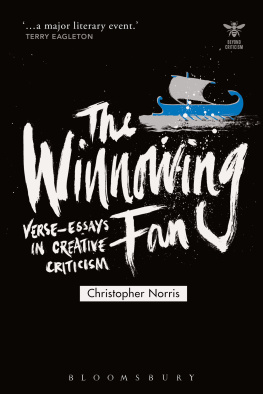

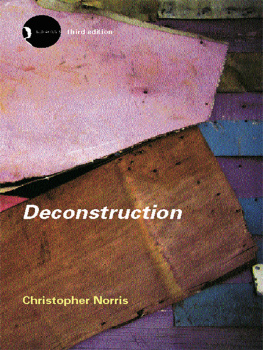
![Norris - Clybourne Park: [a play]](/uploads/posts/book/223649/thumbs/norris-clybourne-park-a-play.jpg)
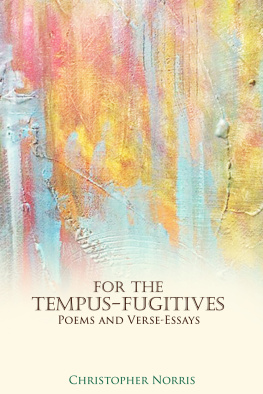
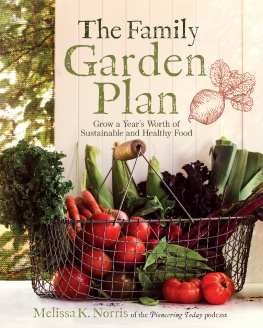
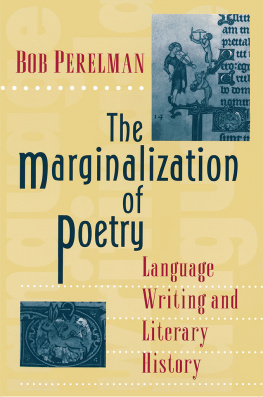
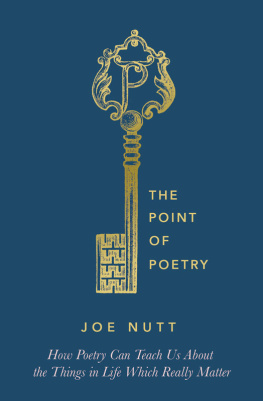

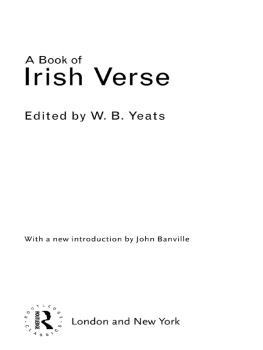

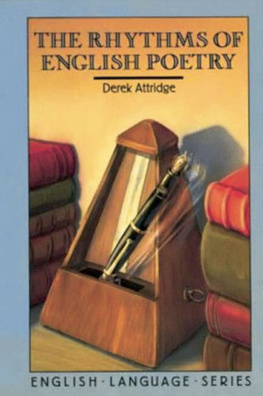
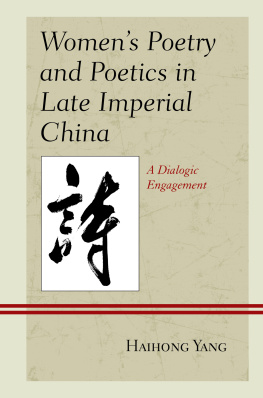
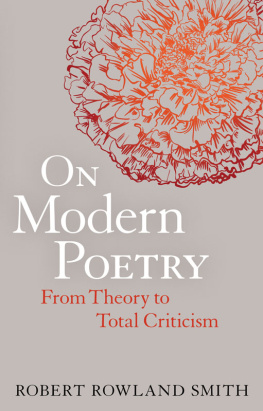
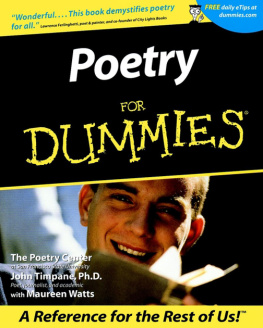

 CONTENTS I If it didnt sound pompous as well as offering too many hostages to critical fortune, I would say that these pieces are mainly intended to launch a revival of that nowadays neglected literary form, the philosophical verse-essay. That I say it nevertheless, albeit under cover of a paltry subterfuge, is due to my long-held belief that such a revival is well worth attempting not only as regards that particular genre but also, more generally, by coming out against the anti-argumentative (even anti-intellectual) bias of much recent poetry. No doubt some will think it absurd to advance any such proposal despite all the manifold shifts of social, intellectual and literary culture since the eighteenth-century heyday of the form. I hope that both elements the positive claim and the qualifying doubt get an adequate airing in the poems, since the claim will surely be rejected if they dont find room for the doubt, and the doubt will have nothing of substance to query if they dont make a plausible job of pressing the claim.
CONTENTS I If it didnt sound pompous as well as offering too many hostages to critical fortune, I would say that these pieces are mainly intended to launch a revival of that nowadays neglected literary form, the philosophical verse-essay. That I say it nevertheless, albeit under cover of a paltry subterfuge, is due to my long-held belief that such a revival is well worth attempting not only as regards that particular genre but also, more generally, by coming out against the anti-argumentative (even anti-intellectual) bias of much recent poetry. No doubt some will think it absurd to advance any such proposal despite all the manifold shifts of social, intellectual and literary culture since the eighteenth-century heyday of the form. I hope that both elements the positive claim and the qualifying doubt get an adequate airing in the poems, since the claim will surely be rejected if they dont find room for the doubt, and the doubt will have nothing of substance to query if they dont make a plausible job of pressing the claim.